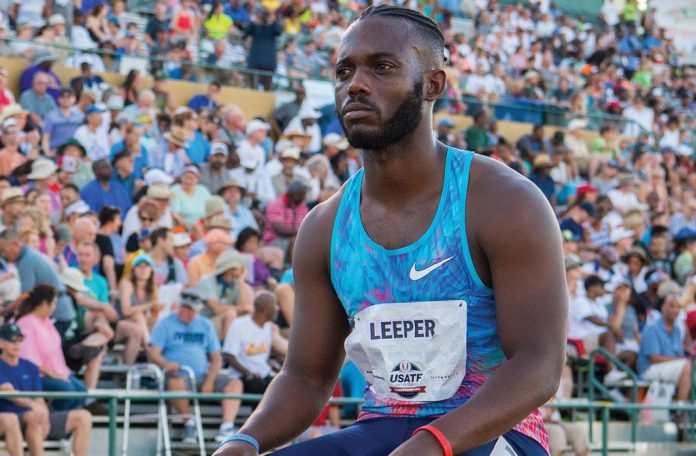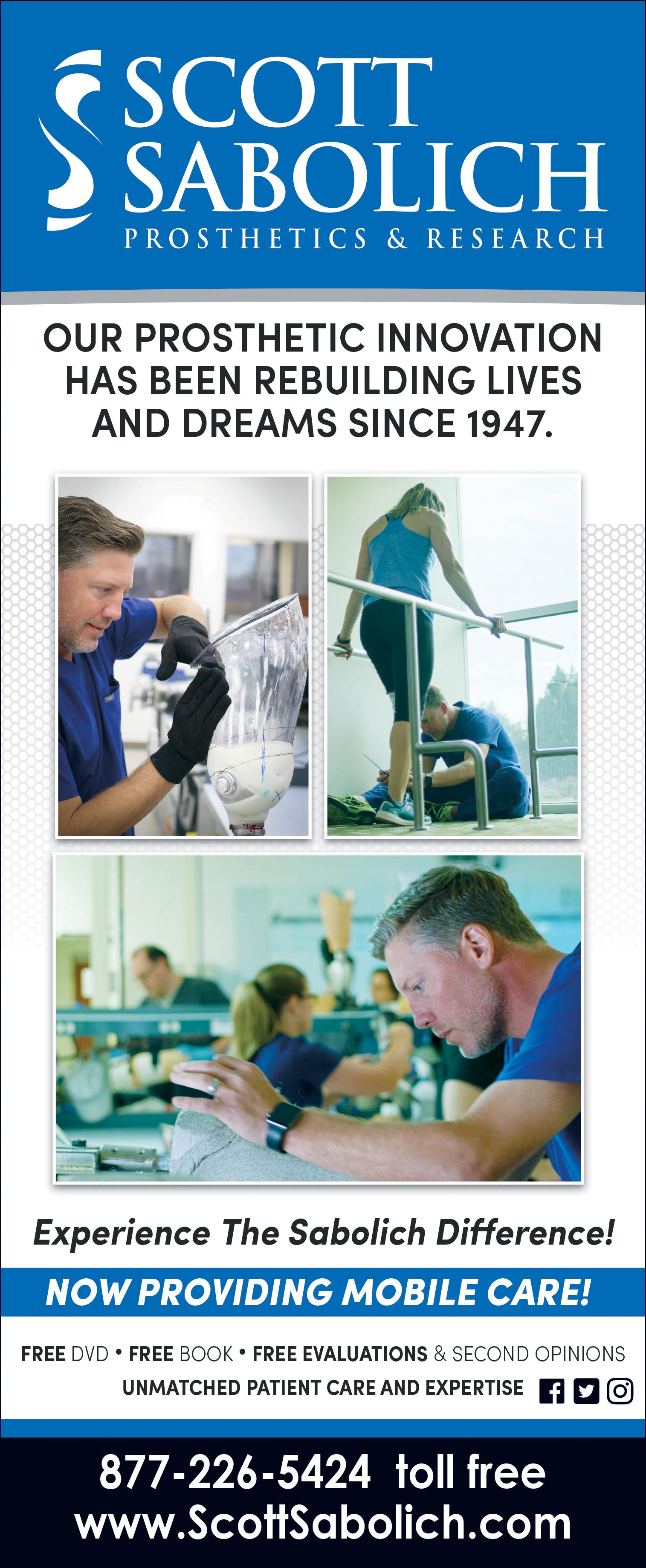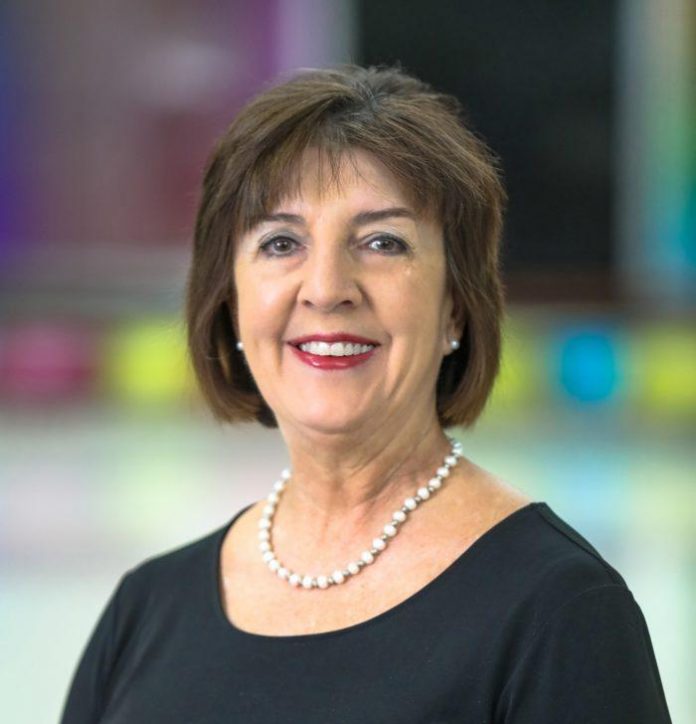HPI Holdings LLC, an operator of hospitals, outpatient centers and clinics in Oklahoma City, INTEGRIS, Oklahoma’s most advanced health care system, and United Surgical Partners International (USPI), a leading provider of ambulatory services in the United States, have entered into an agreement to form a joint venture designed to offer patients and families more choice and flexibility of care settings.
The joint venture combines HPI’s comprehensive service offerings and convenience of care, the INTEGRIS system’s unmatched continuum in Oklahoma and the management infrastructure and capabilities of USPI. It also establishes an affiliation of more than 1,300 accomplished physicians, representing a wide variety of specialties with practices across metro Oklahoma City.
HPI Community Hospital locations include the north campus at 9800 Broadway Extension, the south campus at 3100 SW 89th Street and the Northwest Surgical Hospital at 9204 N. May Avenue. The INTEGRIS network includes Baptist Medical Center, Southwest Medical Center and Lakeside Women’s Hospital in Oklahoma City, as well as Canadian Valley Hospital in Yukon and INTEGRIS Health Edmond hospital in Edmond, OK.
“It is more important than ever that health care leaders continue to find ways to offer high quality care in affordable settings,” says Ed Gray, President and CEO of HPI. “We’ve been successful developers and service providers in standalone settings, and we’re pleased to continue development in that space while also establishing stronger connectivity to INTEGRIS, which offers Oklahoma’s most comprehensive level of services from primary care to transplant and everything in between.”
“The joint venture helps INTEGRIS continue our progress toward improving consumer access to care, delivering exceptional patient experiences, lowering the overall cost of care, and growing the number of people and families we’re able to serve,” says Tim Pehrson, President and CEO of INTEGRIS.
Brett Brodnax, President of USPI, states, “USPI is honored to both expand our relationship with INTEGRIS and establish this partnership with HPI. HPI physicians, management and staff have distinguished themselves by serving the surgical needs of the Oklahoma City community with excellence in quality, safety and patient satisfaction.”
The transaction is expected to close during the fourth quarter of 2018, subject to customary regulatory approvals and closing conditions. Brown Gibbons Lang & Company initiated the transaction and was the exclusive financial advisor to HPI.
HPI Community Hospital Group is a CMS 5-star rated and Blue Distinction Center + operator of physician-owned hospitals, outpatient centers and clinics in Oklahoma City, Okla. For more information visit hpillc.org.
INTEGRIS, an Oklahoma-owned not-for-profit health system in the state, is recognized for quality and innovation and offers advanced treatment options and specialties found nowhere else in the region. INTEGRIS is a member of the Mayo Clinic Care Network. For more information, visit integrisok.com.
Joint Venture formed to Improve Access to Care
Shawnee Nurse receives Daisy Award
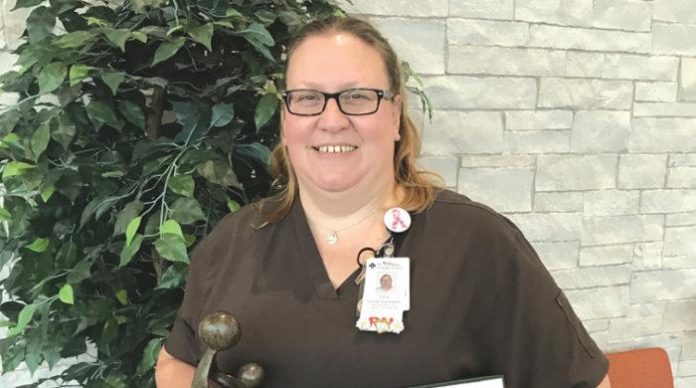
SSM Health St. Anthony Hospital – Shawnee recently recognized one of its nurses with The DAISY Award for Extraordinary Nurses. The award is part of the DAISY Foundation’s program to recognize nurses that go the extra mile for their patients, family and team members.
Tress Hindman, RN, was the recipient of The DAISY Award for her compassionate patient care, but also for her kindness and support of the staff.
In Hindman’s nomination, the staff stated, “Tress as ‘an angel with hidden wings.’” We are thankful for Tress selflessly taking time out of her busy schedule to be of service to her colleagues in their time of need. She is truly an angel indeed!”
The not-for-profit DAISY Foundation is based in Glen Ellen, CA, and was established by family members in memory of J. Patrick Barnes. Patrick died at the age of 33 in late 1999 from complications of Idiopathic Thrombocytopenic Purpura (ITP), a little known but not uncommon auto-immune disease. The care Patrick and his family received from nurses while he was ill inspired this unique means of thanking nurses for making a profound difference in the lives of their patients and patient families.
Nurses may be nominated by patients, families, and colleagues, and they are chosen by a committee of nurses at St. Anthony Hospital to receive The DAISY Award. Awards are given throughout the year at presentations given in front of the nurse’s colleagues, physicians, patients, and visitors. Each honoree receives a certificate commending her or him for being an “Extraordinary Nurse.” The certificate reads: “In deep appreciation of all you do, who you are, and the incredibly meaningful difference you make in the lives of so many people.” The honoree is also given a beautiful and meaningful sculpture called A Healer’s Touch, hand-carved by artists of the Shona Tribe in Africa.
SYNERGY HomeCare of Edmond Raises Money For Alzheimer’s Association
Local Companies Creates Event, The Alzheimer’s Hoedown, to Fight Deadly Disease
For the third year in a row, SYNERGY HomeCare of Edmond, is proud to sponsor an event for the Alzheimer’s Association. The Fountains at Canterbury, located at 1404 NW 122nd Street OKC, OK 73114, will be hosting the Alzheimer’s Hoedown Event on September 13 from 5:00-7:30pm. We ask the community to join us for an uplifting event featuring local musicians, silent auction, games, food, and more! A minimum donation of $10 per person is requested to join in on that fun. This will include a meal, and all proceeds go to the Alzheimer’s Association! For the third year in a row, SYNERGY HomeCare of Edmond, is proud to sponsor an event for the Alzheimer’s Association. The Fountains at Canterbury, located at 1404 NW 122nd Street OKC, OK 73114, will be hosting the Alzheimer’s Hoedown Event on September 13 from 5:00-7:30pm. We ask the community to join us for an uplifting event featuring local musicians, silent auction, games, food, and more! A minimum donation of $10 per person is requested to join in on that fun. This will include a meal, and all proceeds go to the Alzheimer’s Association!
According to the Alzheimer’s Association:
· Someone develops Alzheimer’s every 66 seconds in the United States.
· Alzheimer’s disease is the nation’s sixth-leading cause of death
· More than 5 million Americans are living with the disease.
· There are more than 15.9 million caregivers of people with Alzheimer’s and other dementias in the United States.
“Through the tireless work of our caregivers, we are aware of the dramatic impact Alzheimer’s has on individuals and their families,” says Peter Tourian, founder and CEO of SYNERGY HomeCare.
“We are walking to show our commitment to finding a cure for this disease which according to the Alzheimer’sAssociation is one of the leading causes of death in the United States that does not have a cure, a prevention or a treatment.
”To learn more about SYNERGY HomeCare of Oklahoma, please contact Abbey Trammell at 405-254-3046 or abbeytrammell@synergyhomecare.com.
SYNERGY HomeCare is a non-medical home care company dedicated to providing exceptional and affordable service to anyone of any age.
SYNERGY HomeCare caregivers are available 365 days a year, 24 hours a day, to those in need – including seniors, expectant moms, those suffering from sports injuries and debilitating illnesses, and more. We proudly serve the Greater Oklahoma City metro area, including: Oklahoma City, Edmond, Moore, Norman and the surrounding areas. The company exists to provide genuine services, and it’s why we treat our clients and caregivers with dignity and respect. For additional information, please visit http://www.synergyhomecareedmond.com.
Running the good race

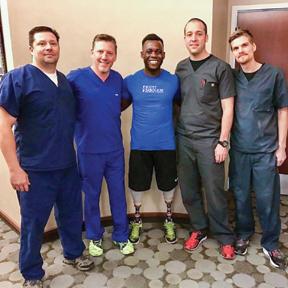
“It’s not whether you get knocked down; it’s whether you get back up.” – Vince Lombardi
by Brandon Rabhar
Blake Leeper, an eight-time Paralympic Track and Field international medalist, world record holder and three-time American record holder, knows all too well the hurt that accompanies falling down. Physically, he has fallen down time and again due to being born with no legs. In the eyes of the Paralympics community, he has fallen from grace due to self-admitted bad personal life decisions.
But every time Blake Leeper has fallen, he has got back up stronger than ever before. And each time, he has risen with a newfound purpose in his life.
Born in the Smoky Mountains of Tennessee, Blake has defied the odds since the moment his parents Billy and Edith welcomed their baby boy in 1989.
“Being born missing one leg is a one in 40,000 chance,” said the jovial Leeper. “But being born without two legs? Those are astronomical numbers.”
Doctors told Leeper’s parents that the best case scenario for their legless son would be living life in a wheelchair. Fortunately for Leeper, his mother knew better. Edith worked as a nurse and was heavily involved in the medical community.
“This is not going to be his story,” Edith told those doctors and her husband nearly 30 years ago. Truly prophetic, Edith knew the key to changing the course of her son’s life was prosthetics.
Fast forward four years, and young Blake had major surgery so that his first legs would fit his little body better. For eight long weeks, Blake was in a full body cast and a wheelchair.
“I remember every single day being in that wheelchair and wanting to go outside. I knew in my head this was the last time I wanted to be in a wheelchair and it was,” recalls Leeper. “From that point on, I’ve been living life to the fullest.”
A purpose was born.
Blake, armed with legs for the first time, literally hit the ground running. He played any and every sport. He roller-bladed with his older brother Kris. So many times in those physically formative years, Blake’s legs would break or fall off, but he would always get back up. His main objective was to show the world how much he could do with his new legs.
In high school, Blake’s best friend just happened to be the best athlete on campus. His name was Coty Sensabaugh, who is currently starring at cornerback for the Pittsburgh Steelers.
“Coty pushed me in a lot of areas where other people were afraid to push me,” said Leeper. “When you’re dealing with people with a disability, others are afraid to push us. But the only way we can get better is to be challenged.”
After high school, Blake enrolled at the University of Tennessee as a pre-med student. He was ready to hang up the sneakers and become an orthopedic surgeon. That all changed the moment he saw Oscar Pistorius sprint across his television during the 2008 Olympics.
“It was the first time I saw an amputee on TV in a major sport,” said Leeper. “I remember thinking, ‘This is what I want to do! I have to get those blades!’”
A purpose was redefined.
Blake got his first pair of running legs the next year. Before he even had time to start seriously training, he and his parents drove 14 hours to Oklahoma to participate in the Endeavor Games and his first ever race. As a rookie competing in a field stacked with national champs, the odds were stacked against him. The doe-eyed novice took first place in all three events he raced in: the 100, 200, and 400 meters.
Two whirlwind weeks later, Blake found himself racing in an international event in Brazil. He ran even faster than he did in Oklahoma, won a silver medal and came close to conquering the world champion.
In 2012, Blake tied Pistorius’s record time in the 400 meters going into the London Paralympics. He was ranked #1 in the 100, #1 in the 200, and #2 in the 400. In London, Blake won the silver medal in the 400 behind previous inspiration Pistorius and took home the bronze in the 200.
Only a few years after getting his running blades, Blake became a celebrated media mainstay. He played alongside superstars Kevin Hart and Chadwick Boseman in the NBA All Star Celebrity Game. His positive personality was welcomed on The Queen Latifah show, the Arsenio Hall show, and the Naomi Campbell fashion show. For the first time in his life, Blake was making big money.
“My life changed and I wasn’t prepared for it. I left college to quit partying, and I changed my environment but I didn’t change the person inside of me,” said Leeper. “I started hanging with the wrong people. Track, TV, interviews, flying everywhere for events. The only way I knew to balance that was to drink.”
Relying on talent, Blake was able to pull off the delicate balancing act of partying and still competing and winning. He broke every American record. He seemed invincible on and off the track.
In 2015, Blake did cocaine and a week later raced in the US Paralympic Nationals, breaking the American record. But he failed the drug test. The punishment was a one year suspension, reduced from two years behind the promise that Blake would get clean. The story broke in the Los Angeles Times.
“I lost my career, I lost my sponsorships, and I lost my legs,” said Leeper. “I hit rock bottom.”
A purpose was knocked down. But it would get back up.
Determined to come back stronger and faster after serving his suspension, Blake needed to find a new pair of running legs. Aaron Holmes from Wiggle Your Toes connected Blake with Scott Sabolich Prosthetics.
Blake walked into the building, back in Oklahoma where his racing career had begun, for the first time wearing two different pairs of legs that he had duct taped together.
“I had to go into my closet of legs I had collected over the years and put them together myself. I walked out with three pairs of legs,” said Leeper. “Scott Sabolich Prosthetics, they’re the best in the world. Their facilities, their lab, their staff. And for them to want to take a chance on me was truly amazing.”
Refocused, Blake was ready to prove that he was the fastest amputee in the world. Along with the new legs, he obtained new coaches, management, a trainer, and a nutritionist in preparation for the 2016 Paralympics in Rio de Janeiro. Running was no longer a hobby or a job, it was his life.
One year after testing positive for cocaine, Blake dropped his 400 meters time from 48 seconds, an American record at the time, to 46.1 seconds. He made the 2016 Paralympics team.
“My parents and my girlfriend Sadie are in Rio. We got a dog and named it Rio. Two weeks before the Paralympics, I got a call. The USA approved my deal, but the international committee did not,” Leeper said. “I was devastated, but I knew it was a self-inflicted wound. I took responsibility.”
After that life altering phone call, Blake went to his room, took off his legs and didn’t leave for three days. His coaches had to bust down Blake’s door to get him out. He walked out of that door a new man.
A fun and easygoing soul, Blake was mad and trained with a chip on his shoulder. The 46.1 he ran qualified him for the 2017 able body national championships, making history as the first amputee to qualify for any national championships.
At trials, Blake ran a blazing 45.5, qualifying for the semifinals. The man with no legs beat 2016 Olympians. The next day, Blake ran a 45.25 and broke Pistorius’s amputee world record, a personal goal of his from day one. He finished 12th overall out of top 64 fastest runners in the nation.
A purpose fulfilled.
To make the 2020 Olympic relay team, Blake needs to cut his time down about half a second and place top 6 overall. That’s his primary focus on the track these days. But it’s getting his life off the track back on the right track that defines the man.
“I love to talk about my failures because those were the most important days of my life. Being suspended actually saved my life,” Leeper said. “That’s my message. It’s one thing being born without legs. I didn’t have a choice. But as an adult, I had to lie in the bed I made. My mamma always said that.”
Edith Leeper was right. Being in a wheelchair would not be her son’s story. His story is one of triumph, tragedy, redemption and most importantly, purpose. And it’s a story that he fully embraces and loves.
“I’m living life to the fullest right now, trying to be present in the moment,” said Leeper. “But down the road, I’m gonna be like holy smokes, I played basketball with Black Panther!”
Oklahoma Hospital Association Names Patti Davis as President
The Oklahoma Hospital Association (OHA) board of directors has named Patti Davis president, effective Sept. 5. Davis replaces Craig W. Jones, who will retire Aug. 31 after 21 years leading OHA. Davis is only the fourth executive to lead the organization in its 99-year history.
We are excited about the selection of Patti to lead the OHA as we enter our 100th year of the association,” said David Whitaker, FACHE, OHA board chairman, chief administrative officer, Mercy-West Community. “Her experience in both small, rural hospitals and large, urban medical centers, as well as her past experience on the OHA staff will be a tremendous asset as we continue our important work strengthening hospitals across the state.”
Jimmy Leopard, FACHE, chair of the search committee and CEO, Wagoner Community Hospital, said “After an extensive nationwide search, Patti emerged as the best possible candidate to lead the organization. As both an OHA member and as OHA staff, Patti has been instrumental in a number of key OHA advocacy initiatives and we look forward to working with her as hospitals in Oklahoma face many challenges.”
“I am humbled to be selected for this position and I’m ready to get to work taking on the important role of leading the association into our next 100 years,” Davis said. “Every day, Oklahomans depend on our members’ services, and we must work to ensure the highest quality care is available to those who need it.”
Davis comes to OHA from OU Medicine, where she has served as senior vice president of external affairs, and prior to that, senior vice president of strategy and business development since 2013. She was executive vice president at the Oklahoma Hospital Association from 2001 to 2013, where she coordinated operations and special projects and led advocacy efforts on state and federal issues. She was OHA vice president, government relations from 1996 to 2001.
Before joining the OHA staff in 1996, Davis was CEO of Carnegie Tri-County Municipal Hospital. A graduate of the University of Oklahoma, Davis will complete her Master of Legal Studies in Healthcare Law degree at OU this fall.
While in Carnegie, Davis served as chairman of the OHA board of directors and received the association’s highest award, the W. Cleveland Rodgers Distinguished Service Award. She has also served on the Rural Health Association of Oklahoma board, the Medical Advisory Committee of the Oklahoma Health Care Authority, and the Trauma Advisory Council for the Oklahoma State Department of Health.
Davis is a resident of Norman, Okla.
Family Business: MCM helps seniors choose
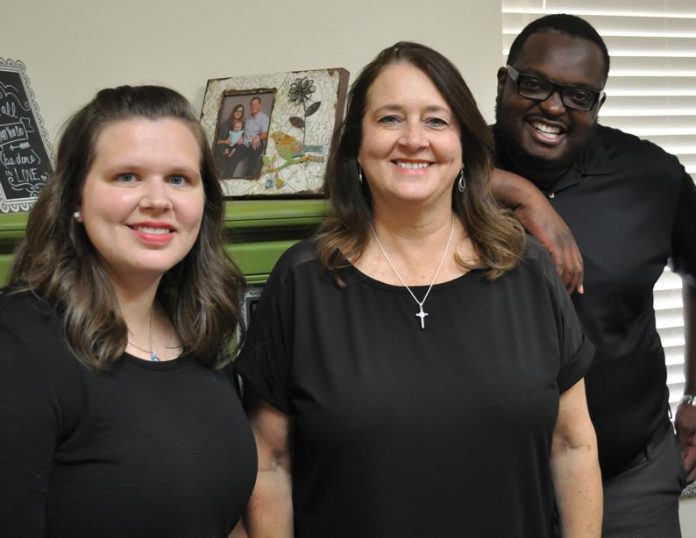
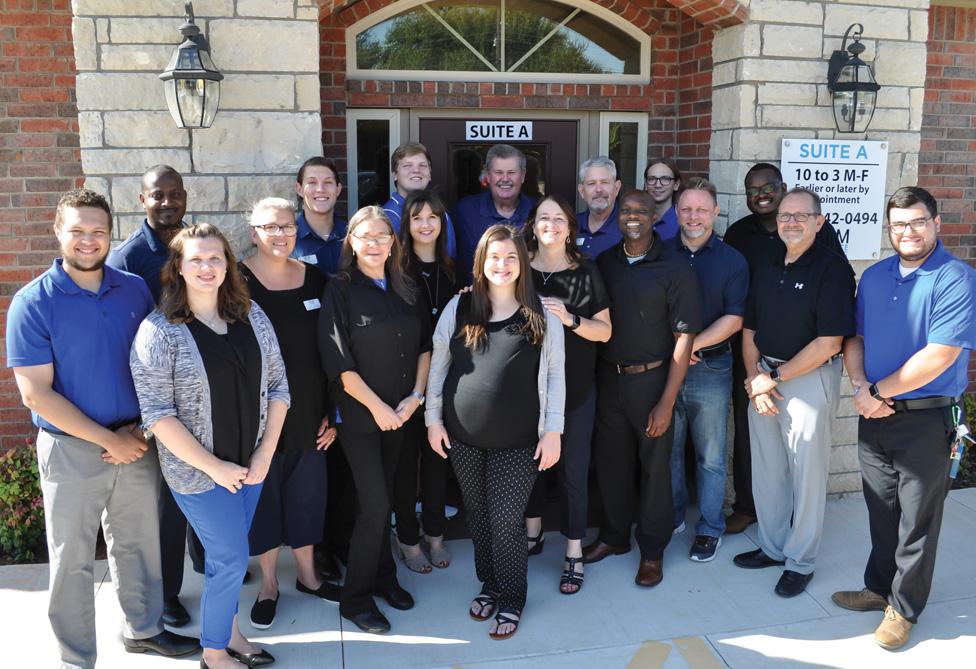
by Bobby Anderson, Staff Writer
Three decades ago Ginny Curtis began a career in insurance that would change her customers’ lives forever.
“We run the business like we’re working for our parents or grandparents,” says Curtis, owner of MCM Insurance LLC. “The question I always ask my agents is ‘Did you make a friend?’”
“If the answer is yes, then it wouldn’t matter if they made a sale or not” MCM is most concerned that the client is enrolled in the right plan.
MCM has grown their business to 30 agents statewide, including 3 of her children.
“It’s awesome,” Curtis said of working with family. “From early on I taught them the value of customer service and that it’s more about service and relationships than making a nickel.”
“They’ve adopted that philosophy and have seen it work over the years.”
As 2018 begins to wind down, one of the most important times of the year for seniors begins rapidly approaching. The Medicare Annual Enrollment Period (AEP) occurs annually from (Oct. 15-Dec. 7). AEP is a time in which current Medicare beneficiaries can choose to change part of their coverage. They can change their Medicare Advantage Plan (Part C) and/or Prescription Drug Plan (Part D). It’s a time to reevaluate based on their benefits, health, and finances. If they find a plan that is a better fit for their needs than their current plan, they can then switch to, drop or add a Medicare Advantage or Part D plan.
During AEP Curtis’ agency goes into overdrive to make sure that everyone that needs help facilitating the changes coming their way is reached. “It’s very important to us that each person that comes through our agency chooses their plan based on their specific needs,” said Ginny. During an appointment with the agents from MCM, they will compare plans based on the customers list of medicines and doctors to narrow down which plan will cover all their needs the best.
In addition to individual appointments, MCM offers no-cost Navigating Through Medicare informational sessions around the metro.
The hour-long informational sessions allow people to become more familiar with the ins and outs of Medicare in a low-key setting.
“We don’t talk company plans or premiums,” Curtis said. “It’s simply teaching them the basics of Medicare and how to navigate through it.”
MCM will open its Medicare Store Oct. 2-5 with every Medicare Advantage option available on display for customers to compare.
“It’s a great time for them to shop, ask a lot of questions and find the information they need without feeling the pressure of having to make a decision,” Curtis said. “Really what they should do is shop that first 2 weeks and then by Oct. 15 they can schedule a time to figure out what’s best for them and make a decision.”
MCM Insurance is family owned and operated. Their agents are all dedicated to helping seniors not only find the right healthcare solution but understand what they’re purchasing.
“We are a little different than some agencies, in that we represent all the Medicare Advantage companies,” Curtis explained. “We have a great contract with every carrier, and they all pay the same fees so there’s no reason for us to sway a client one way or another.”
While many appointments are scheduled in the comfort of client homes, Curtis staffs the office at 2232 W. Hefner Road in the Village so that clients can walk in anytime 10 a.m. to 3 p.m. and speak with an agent directly without an appointment. During AEP they extend their hours to 9 a.m. to 5 p.m.
MCM also has agents in Tulsa, Claremore and Lawton. You can reach the OKC office by calling 405-842-0494. You can also view their calendar and get more info on their website at www.mcmmedicare.com.
“Share the Love” with your donation to United Way of Central Oklahoma
Love’s Travel Stops & Country Stores has announced it will team up with United Way of Central Oklahoma and match any new and increased gifts from existing workplace campaigns and individual donors up to $200,000.
“Love’s is proud to partner once again with the United Way to make a positive impact in central Oklahoma,” said Jenny Love Meyer, vice president of communications for Love’s. “Our employees give generously every year to support United Way organizations making a measurable difference in our community. This year, we are challenging our neighbors to step up with us. Love’s will match dollar for dollar any new donation to the United Way made by individuals or local businesses up to $200,000.”
This gift comes at a time when the needs for health and human services continue to rise while resources remain limited. New dollars and the impact in the community will be doubled, allowing more central Oklahomans to benefit from the programs that United Way helps to fund at our 58 Partner Agencies.
“Love’s is a staple in our community because they give back so generously and truly care about people and the challenges they face,” said Debby Hampton, United Way of Central Oklahoma president and CEO. “With Love’s support, we’ll be able to touch more lives and make an even bigger impact in our community, and that’s what Love’s is known for – caring for those who need a hand-up.”
Donations may be made online at unitedwayokc.org or by giving through your workplace campaign.
Salvation of Hope: Senior gives back
by Bobby Anderson, Staff Writer
Twenty five years ago, Deanna Waltens fled an abusive and threatening situation.
Life had put her in such a horrible situation that the prospect of leaving with nothing in hand was better than certain misery that waited for her at home.
“I was like Forrest Gump and I kept running and running and running,” Waltens laughed, looking back on her past heartaches.
“Maybe I could have done things better. Maybe I could have thought things out. Sometimes you don’t get that chance. So if you’re in that situation you just do what you have to do.”
Along the way she found people waiting to help.
She stayed at an emergency shelter.
“I saw all the hurt and all the need through all the little children that were there with their moms,” she said. “That really started opening my eyes a lot.”
Realizing she was homeless and chronically hungry she came back to Oklahoma.
Staying with her mom in Choctaw, she put her paralegal degree to work with a local attorney.
After more than a year she realized she needed something more permanent.
An application process through the federal government landed her a job with the immigration department.
After 15 years with the immigration department she retired.
Now she spends her days helping those in need at the Salvation Army Central Oklahoma Area command food pantry.
“I came here because actually I saw something in Oklahoma’s Senior News and Living about them needing summer volunteers,” she said. “I realized what it is to be hungry, cold and scared and all the things that go with the situation.”
She stopped by and hasn’t left since.
“It’s a lovely place,” Waltens said. “The people are so great. All the other volunteers are so sweet I really love it here. I decided this was for me.”
Waltens volunteers now, largely because it was volunteers who helped her journey.
Liz Banks, volunteer director at the Salvation Army Central Oklahoma Area Command, says that’s one of the beauties of the service. Lawyers, police officers, seniors, millennials – people from all walks and professions – come together with a common goal to help their fellow human being.
It truly is an army of people coming together to help those in need.
And the need is always great. That’s why Banks loves it when she gets a call for someone inquiring how they can help.
Right now, Banks is in immediate need of spanish translators. Help is ready but sometimes communication barriers make it difficult.
If you can help in any way with time or talent call 405-246-1107.
“I went to churches and they were good and helpful but nothing like this,” Waltens said. “To me this is the ultimate in food pantries. This is just really, really good.”
Waltens knows the need is there because it was once her.
Someday it could be you.
“I think maybe they understand some but unless you’ve been there you don’t understand the real impact of getting up and wondering if you’re going to have anything to eat today,” she said. “People don’t realize, I guess they think it’s third world countries that face it but you face it here.”
She likes the fact people can come and get short-term help while others can utilize services longer term.
“Makes me feel really good,” Waltens smiled. “I realize that the Salvation Army is just that, it’s salvation for a lot of people – not only temporarily but spiritually, too. So much good goes on here. I see the Red Shield Diner help people every day.”
“I know the shelter. I know it’s a great place to be. It’s just a helping situation.”
Waltens comes from a generation that takes great pride on self reliance. Hard times are just opportunities to pull up your bootstraps.
But sometimes life leaves you shoeless.
“Don’t worry about coming here if you need help because anyone of us is 24 hours away from something like that. Not only does it give them that experience and help but it gives us the opportunity to serve.”
“Everytime I help someone through there I think I’m getting a blessing.
“I get more out of it.”
Brightmusic Society Announces its 2018-19 Concert Season
The Brightmusic Society of Oklahoma announces the 2018-19 concert season of the Brightmusic Chamber Ensemble, its 16th as Oklahoma City’s premier chamber music ensemble. Five regular-season concerts and a four-concert Summer Chamber Music Festival will be presented in Oklahoma City’s beautiful and historic St. Paul’s Cathedral, recognized for its acoustic richness.
Concert 1 Sept. 25 7:30 pm “Voilà: Viola” will feature works spanning three centuries and featuring Miles Hoffman on viola in a trio by Lowell Liebermann, short pieces for clarinet, viola and piano by Max Bruch and Mozart’s String Quintet in G minor for two violins, two violas and cello. Six Brightmusic Ensemble members will join Mr. Hoffman in the season premier.
Concert 2 October 30 7:30 pm “Beethoven’s Vienna” celebrates the music that took the Austrian capitol by storm in the late 18th and early 19th centuries. This concert features a work from each of Beethoven’s three compositional periods, illustrating the evolution of one of history’s most influential composers. In performance with the Brightmusic Chamber Ensemble will be renowned violinist Aaron Berofsky in the early-period “Spring” Sonata, the middle-period “Ghost” trio and a set of late variations.
Concert 3 Jan. 15 7:30 pm “Russian Romantics” presents a pair of works by Russian late romantics Sergei Rachmaninoff, considered by many to be the greatest pianist of the 20th century, and Sergei Taneyev, Rachmaninoff’s teacher of counterpoint at the Moscow Conservatory. Seven ensemble musicians will present Rachmaninoff’s sonata for cello and piano and a lush and lively piano quintet by Taneyev.
Concert 4 March 19 7:30 pm Get your reed fix here! “Reeds A-Plenty” presents an evening of six works for winds and piano. Six musicians will perform a wide-ranging mix of compositions from the late 18th- through mid-20th centuries by a diverse group of mostly-French composers, along with a Czech and a Russian.
Concert 5 April 16 7:30 pm “Mozart: From Salzburg to Vienna” wraps up the regular season with the works of the prodigy from Salzburg, including perhaps his best-known and best-loved work, “Eine kleine Nachtmusik (“A Little Night Music). Join us for this enchanting all-Mozart evening. And it isn’t over yet: Watch for our Eighth Summer Chamber Music Festival coming in June.
Season Memberships. Season passes for all five Regular-Season concerts AND all the concerts of the Summer Chamber Music Festival are available for $100/person, a remarkable bargain for NINE concerts by some of the most distinguished musicians in Oklahoma and beyond. That comes out to only $11.11 per concert!
Avoid the line! Purchase your Season Membership on our website, Brightmusic.org, and your season pass card will be mailed to you by early September. Or get yours at the door at the first concert. And please consider making an “over and above” tax-deductible contribution to help keep ticket prices affordable for all and continue our policy of free admission for students and children, since they are the future of chamber music. See the side bar and click on the link on our “Home” page.
Single Concert Admission: Tickets available at the door, $20 each. Children are free, as are students and active-duty military personnel, with ID.
Minute Story — Night Light
By Rix Quinn
The most important light in our house is the smallest one. Like many families, we keep a tiny nightlight in a dark hallway.
That bulb’s kept me safe for years. When our child was little, it illuminated a path to her room, so we wouldn’t stumble if she called us. Later, it kept us from tripping over our large and frequently sleeping dog.
Not long ago, before guests came over, I pulled the light out so I could plug in a vacuum cleaner. Then, I forgot where I put it.
Bad idea! We couldn’t find the nightlight for several days, and I stumbled around in the dark. The nightlight’s simple mission is clear. It brightens one specific area that needs it most.
My goal is to be more like my little nightlight. I don’t offer much illumination, but at least I can help a little bit.
SAVE on Medicare Supplement Insurance!
SAVE on Medicare Supplement Insurance! Get a FAST and FREE Rate Quote from Medicare.com. No Cost! No Obligation! Compare Quotes from Major Insurance Cos. Operators Standing By. CALL 1-844-319-5378.





